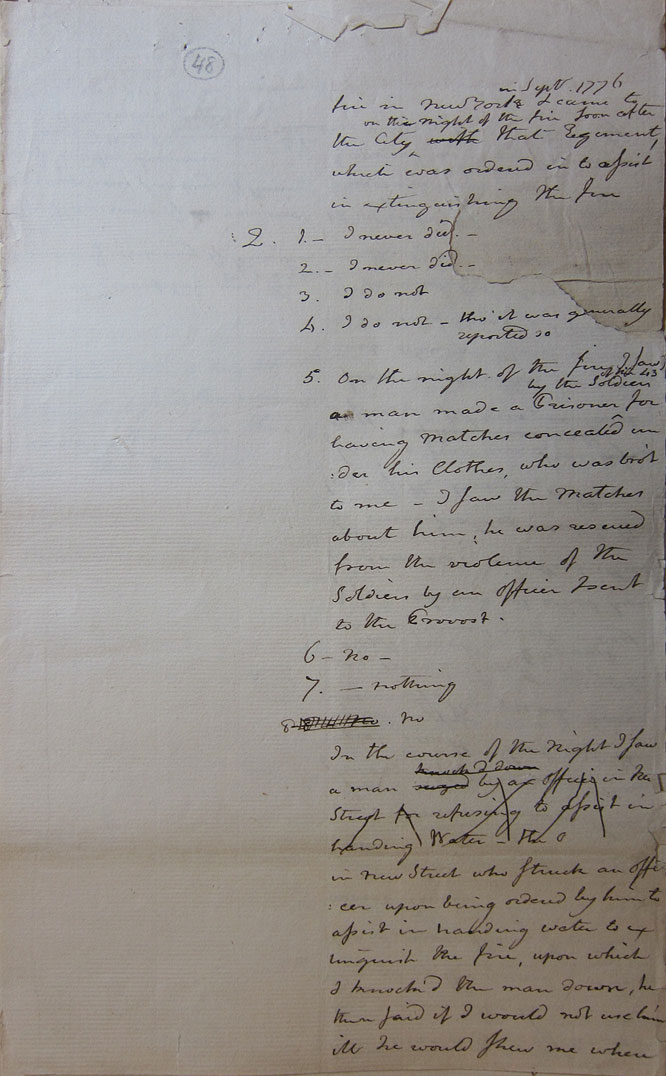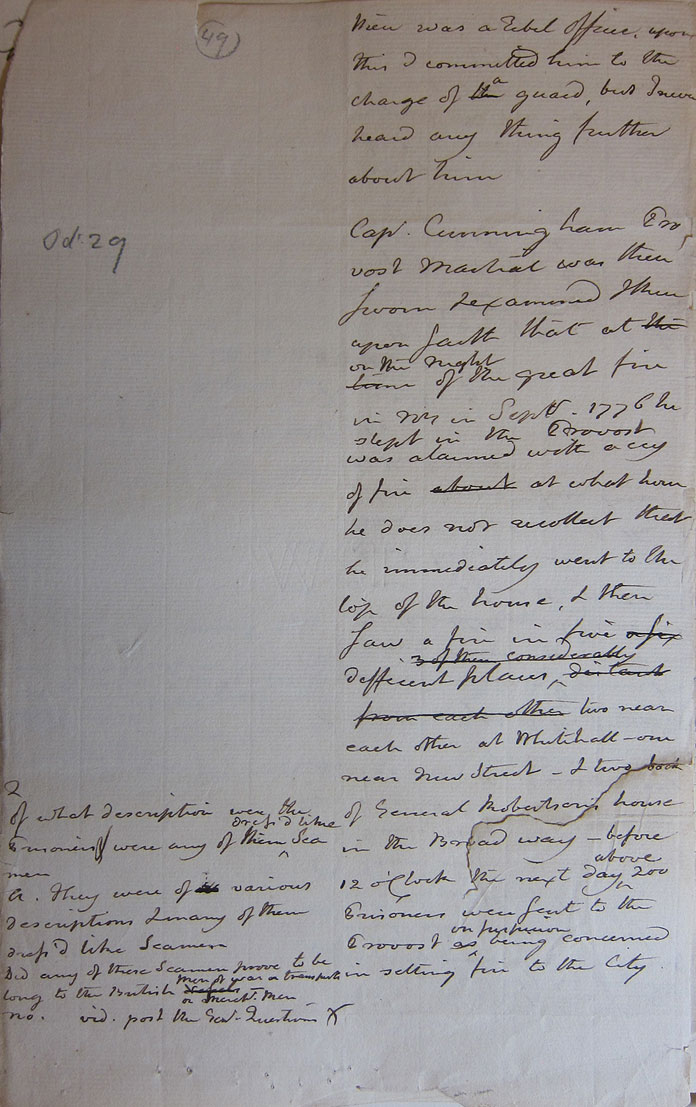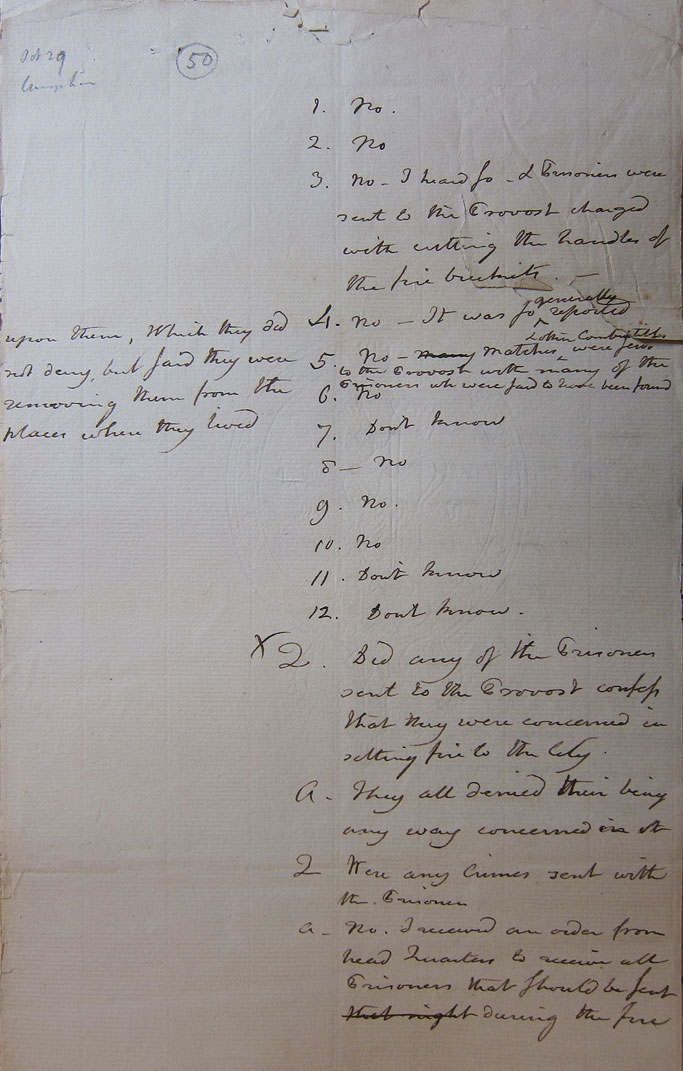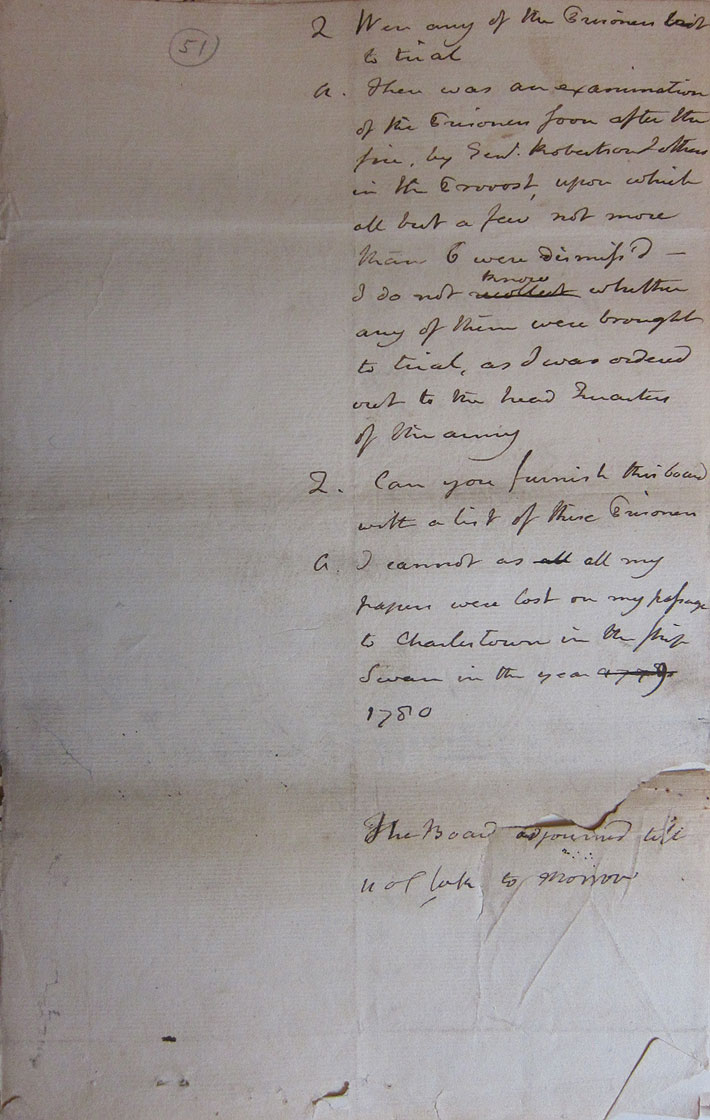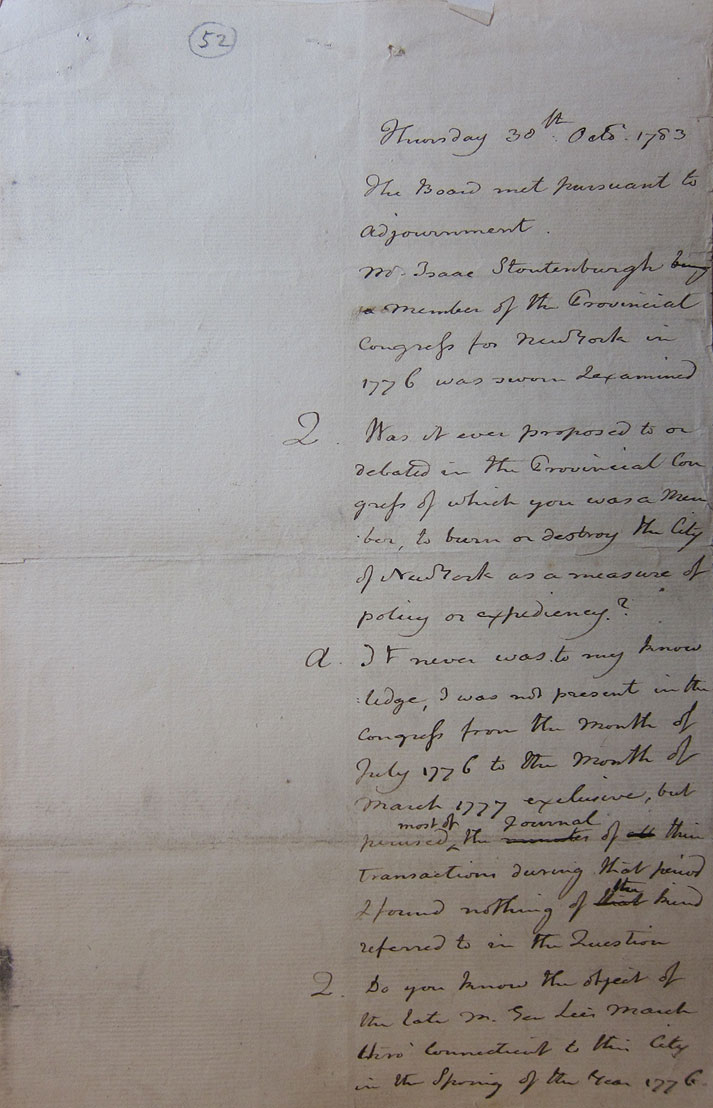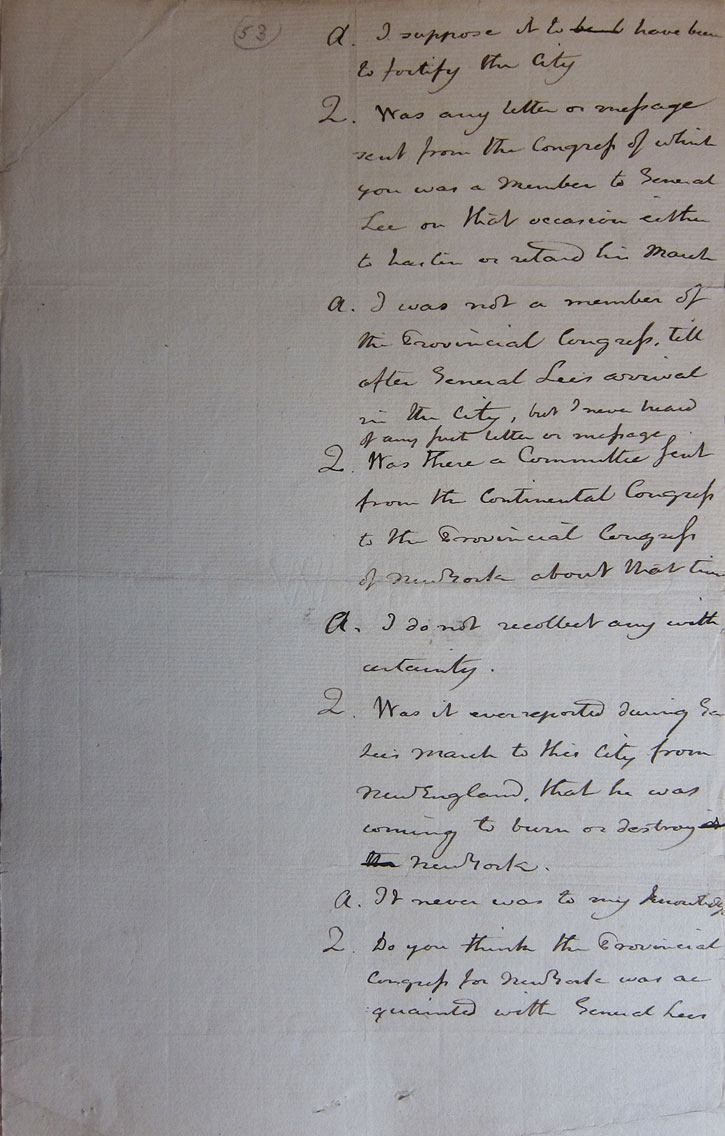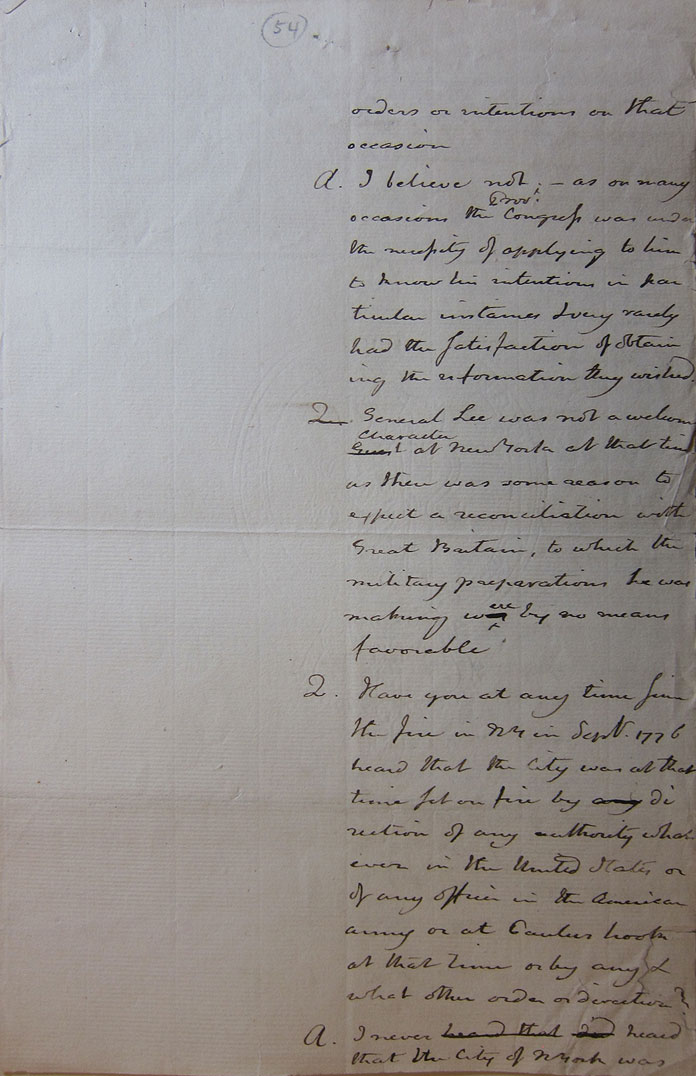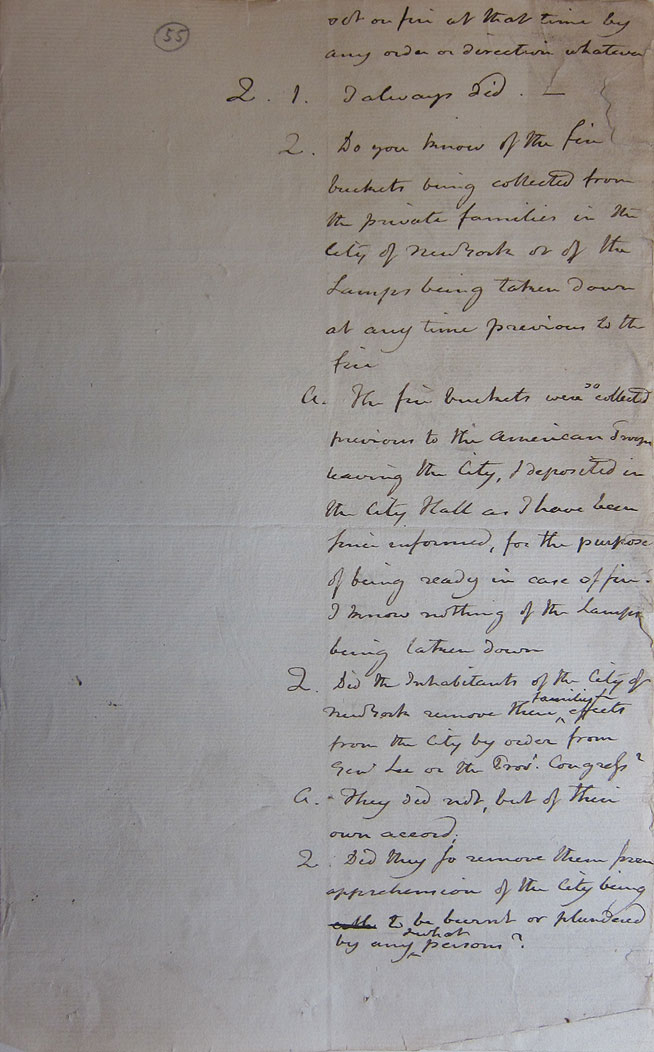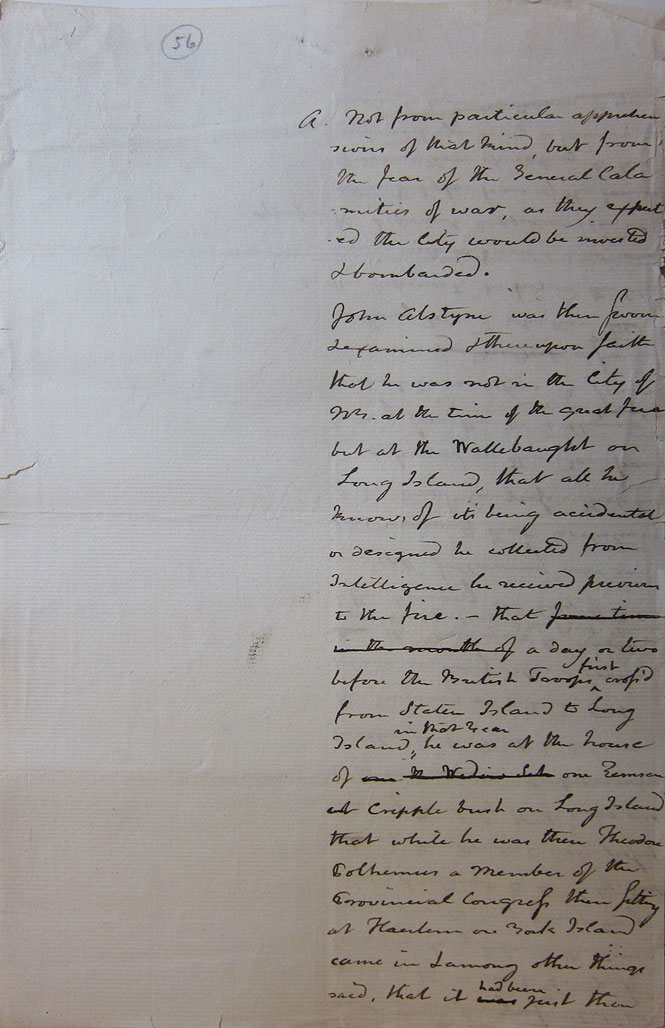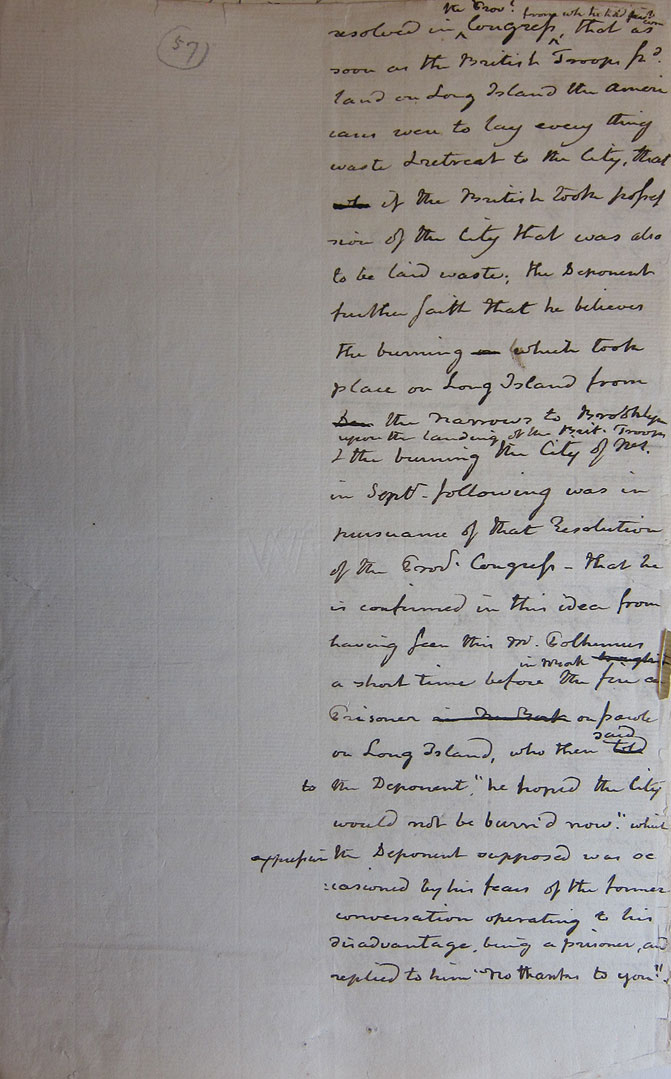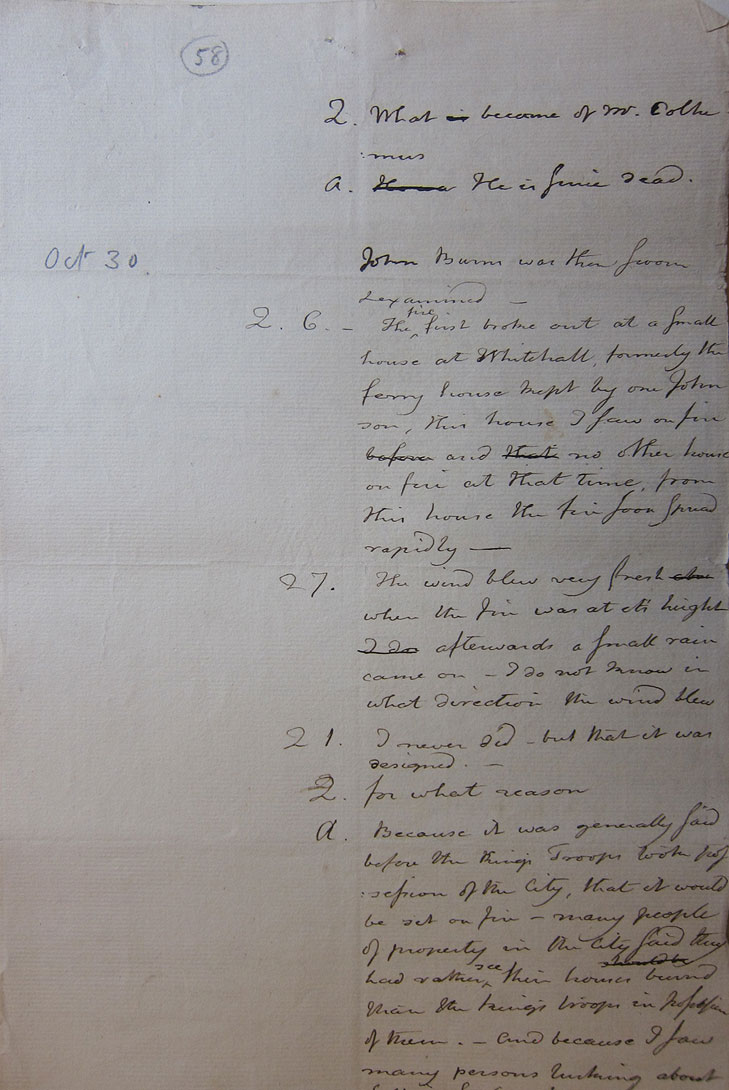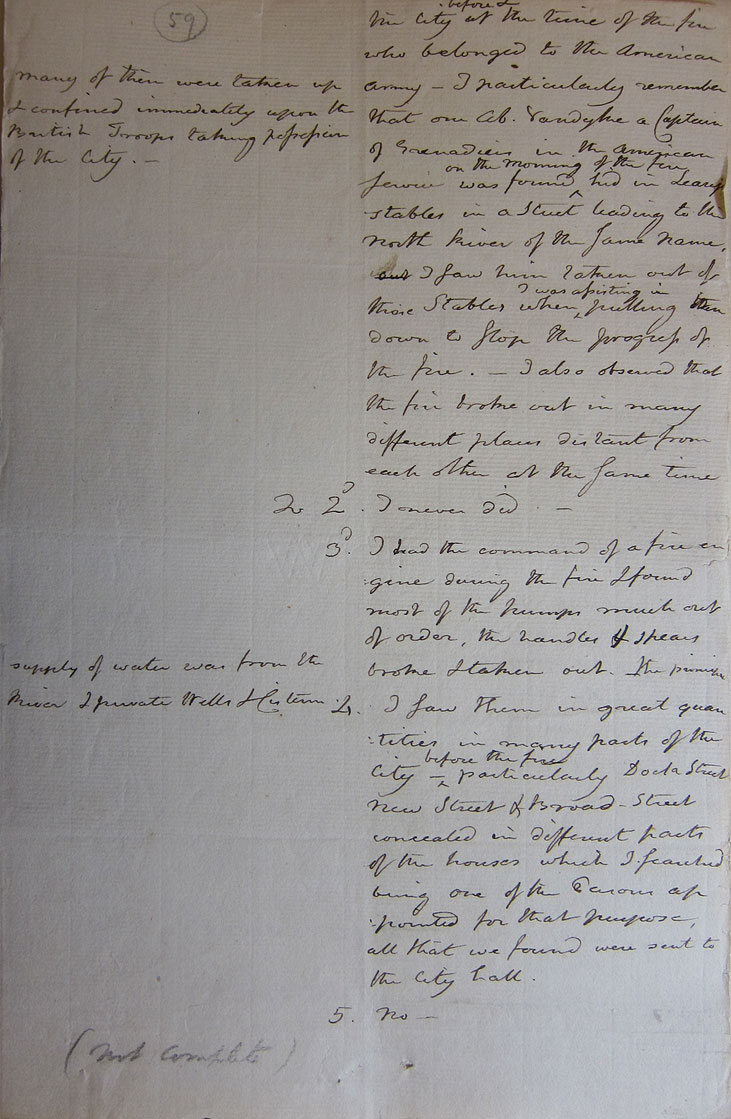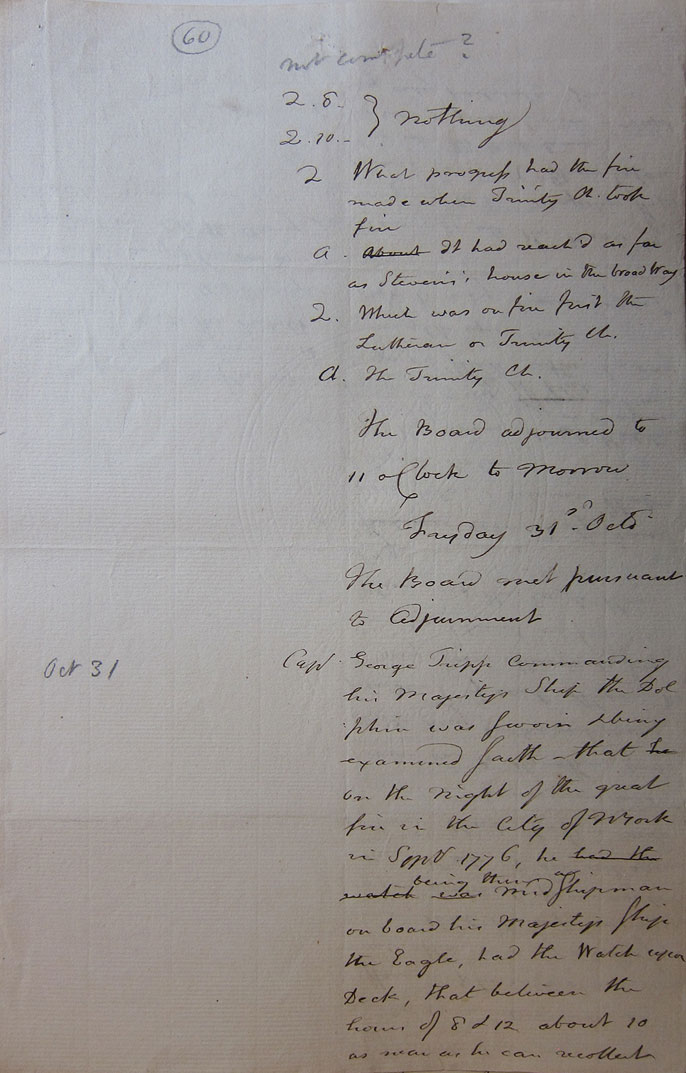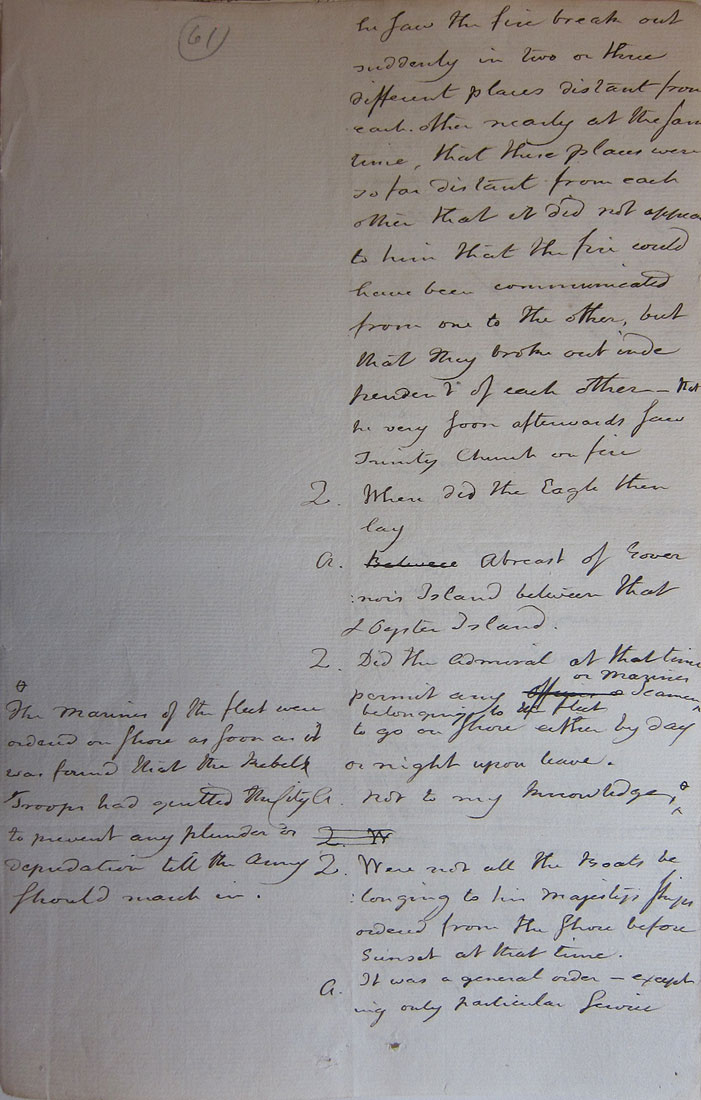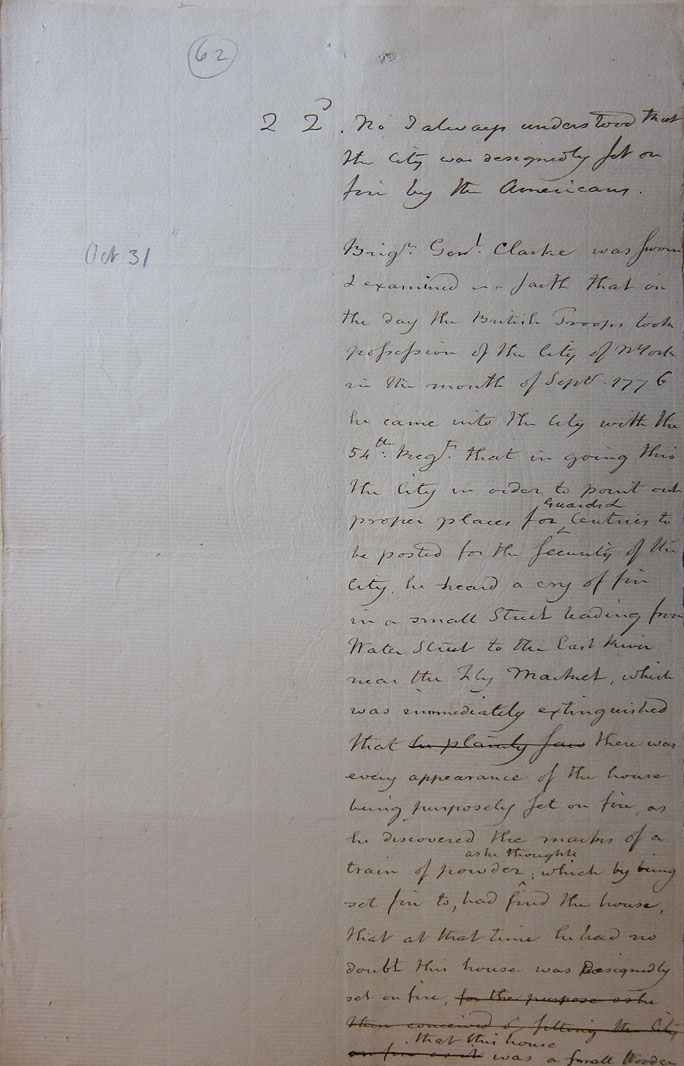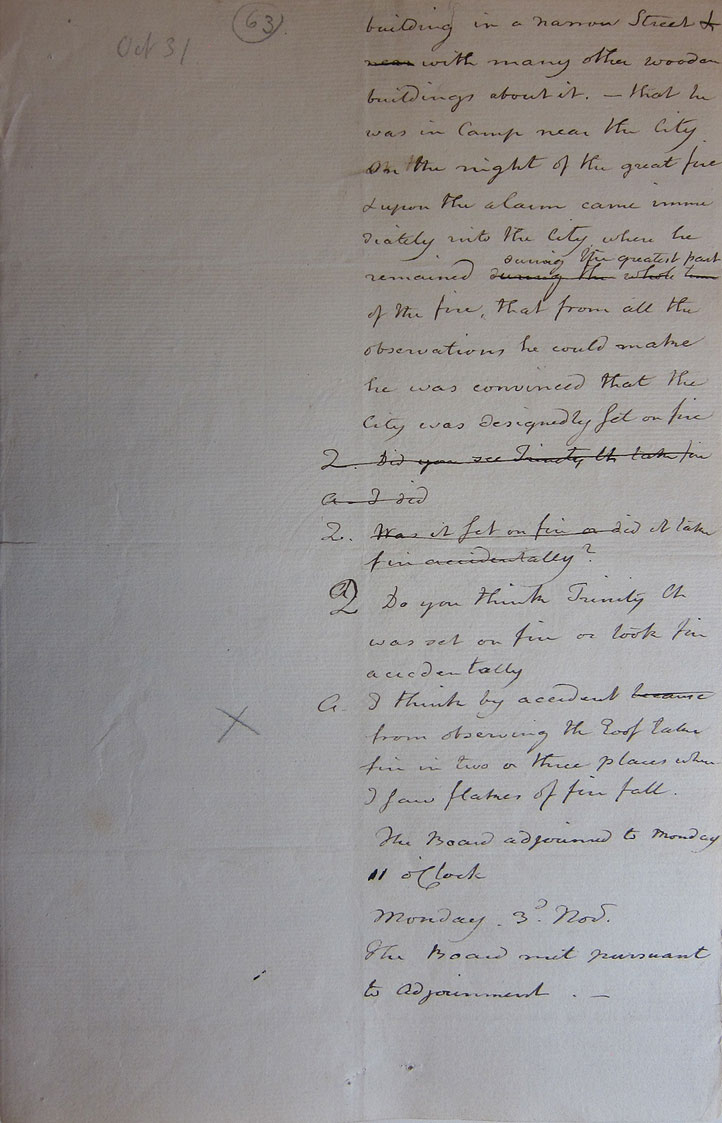Carleton Commission on the Great Fire of New York in 1776 (Dated 1783)
Mr. McIntyre
Surgeon was then sworn and examined. And thereupon saith he was Surgeon of the 43rd Regt. At the time of the great
Fire in New York in Sept. 1776 and came to the City on this night of the fire soon after that - regiment which was ordered in to assist in extinguishing the fire
Q.1. – I never did.-
2. – I never did.-
3. I do not
4. I do not – tho' it was generally reported so
5. On the night of the fire I saw a man made a Prisoner for having Matches concealed under his clothes, who was bro't to me – I saw the Matches about him, he was rescued from the violence of the Soldiers by an Officer and sent to the Provost.
6 – No –
7. – nothing
8. no
In the course of the Night I saw a man in New Street who struck an officer upon being ordered by him to assist in handing water to extinguish the fire, upon which I knock’d the man down, he then said If I would not (unclaim ill) he would shew me where..."
"...there was a Rebel Officer, upon this I committed him to the charge of a guard, but I never heard anything further about him
Capt Cunningham
Provost Marshall was the sworn and examined and thereupon saith that on the Night of the great fire in NY in Sept. 1776 he slept in the Provost was alarmed with a cry of fire at what hour he does not recollect that he immediately went to the loft of the house, and then saw a fire in five different places two near each other at Whitehall – one near New Street – and two back of General Robertson’s house in the Broad way – before 12 o'Clock the next day above 200 Prisoners were sent to the Provost on suspicion being concerned in setting fire to the City.
Q Of what description were the Prisoners and were any of them dress'd like Seamen
A. They were of various descriptions and many of them dress'd like Seamen
Did any of these Seamen prove to belong to the British Men of War or transports
No. vid. post the 9(cnt) – Questions X"
"1. No.
2. No
3. No – I heard so – and Prisoners were sent to the Provost charged with cutting the handles of fire buckets. –
4. No – It was so generally reported
5. No – Matches and other Combustibles were sent to the Provost with many of the Prisoners wh were said to have been found upon them, which they did not deny, but said they were removing them from the places where they lived
6. No
7. Don't know
8 – No
9. No.
10. No
11. Don't know
12 Don't know.
X Q. Did any of the Prisoners sent to the Provost confess that they were concerned with setting fire to the City
A. They all denied their being any way concerned in it
Q. Were any (Crimes) sent with these prisoners
A. No. I received an order from head quarters to receive all Prisoners that should be sent during the fire"
"Q. Were any of the Prisoners (bict) to trial
A. There was an examination of the Prisoners soon after the fire, Gen. Robertson and others in the Provost, upon which all but a few not more than 6 were dismiss’d – I do not know whether any of them were brought to trial, as I was ordered out to the head quarters of this army
Q. Can you furnish this board with a list of these Prisoners
A. I cannot as all my papers were lost on my passage to Charlestown in the ship Swan in the year 1780
The Board adjourned till 11 oClock to morrow"
"Thursday 30th Oct. 1783
The Board met pursuant to Adjournment.
Mr. Isaac Stoutenburgh
a member of the Provincial Congress for New York in 1776 was examined
Q. Was it ever proposed to or debated in the Provincial Congress of which you was a member, to burn or destroy the City of New York as a measure of policy or expediency?
A. It never was to my knowledge, I was not present from the Month of July 1776 to the Month of March 1777 exclusive, but perused most of the Journal of their transactions during that period and found nothing of the kind referred to in the Question
Q. Do you know the object of the late M. Gen Lee’s March thro’ Connecticut to this City in the Spring of the Year 1776."
"A. I suppose it to have been to fortify the City
Q. Was any letter or message sent him from the Congress of which you was a member to General Lee on that occasion either to hasten or retard his March
A. I was not a member of the Provincial Congress, till after General Lee's arrival in the City, but I never heard of any such letter or message
Q. Was there a Committee sent from the Continental Congress to the Provincial Congress of New York about that time
A. I do not recollect any with certainty.
Q. Was it ever reported during Gen. Lee's March to this City from New England, that he was coming to burn or destroy New York.
A. It never was to my knowledge
Q. Do you think the Provincial Congress for New York was acquainted with General Lee's..."
"...orders or intentions on that occasion
A. I believe not; - as on many occasions the Prov. Congress was under the necessity of applying to him to know is intentions in particular instances and very rarely had the satisfaction of obtaining the information they wished.
General Lee was not a welcome character at New York at that time as there was some reason to expect a reconciliation with Great Britain, to which the military preparations he was making were by no means favorable.
Q. Have you ever heard at any time since the fire in NY in Sept 1776 heard that the City was at that time set on fire by direction of any authority whatever in the United States or of any officer in the American army or at Paulus hook at that time or by any and what other order or direction?
A. I never heard that the City of NYork was..."
"...set on fire at that time by any order or direction whatever
Q.1. I always did. –
2. Do you know of the fire buckets collected from private families in the City of New York or of the Lamps being taken down at any time previous to the fire
A. The fire buckets were collected previous to the American troops leaving the City, and deposited in City Hall as I have been since informed, for the purpose of being ready in case of fire. I know nothing of the Lamps being taken down
Q. Did the Inhabitants of the City of New York remove their families and effects from the City by order from Gen Lee or the Prov. Congress?
A. They did not, but of their own accord;
Q. Did they remove them from apprehension of the City being to be burnt or plundered by any and what persons?"
"A. Not from particular apprehensions of that kind, but from the fear of the General Calamities of war, as they expected the City would be invested and bombarded.
John Alstyne
was then sworn and examined and thereupon saith that he was not in the City of NY. at the time of the great fire but at the Wallebaught on Long Island, that all he know, of its being accidental or designed he collected from Intelligence he received previous to the fire. – that a day or two before the British troops first cross'd from Staten island in that year, he was at the house of one (Remsan and Cripple bush) on Long Island that while he was there Theodore Polhemus a member of the Provincial Congress then sitting at Haerlem on York Island came and among other things said, that it had been just then..."
"...resolved in the Prov'l Congress from which he had just come that as soon as the British Troops (pd.) land on Long Island the Americans were to lay everything waste and retreat to the City, that if British took possession of the City that was also to be laid waste; the Deponent further saith that he believes the burning which took place on Long Island from the Narrows to Brooklyn upon the landing of the Brit Troops and the burning the City of NY in Sept. following was in pursuance of that Resolution of the Prov. Congress – that he is confirmed in the idea from having seen this Mr. Polhemus in NYork a short time before the fire a Prisoner on parole on Long Island, who then said to the Deponent, "he hoped the City would not be burn'd now." which (apprehension) the Deponent supposed was occasioned by his fear of the former conversation operating to his disadvantage being a prisoner, and replied to him 'No thanks to you.'"
"Q. What became of Mr. Polhemus
A. He is since dead.
John Burns
was then sworn and examined
Q.6. The fire broke out at a small house at Whitehall, formerly the ferry house kept by one Johnson, this house I saw on fire and no other house at that time, from this house the fire soon spread rapidly –
Q7. The wind blew very fresh when the fire was at its height afterwards a small rain came on – I do not know in what direction the wind blew
Q1. I never did – but that it was designed. –
For what reason
A. Because it was generally said before the King's Troops took possession of the City, that it would be set on fire – many people of property in the City said they had rather see their homes burned than the king’s troops in possession of them. – And because I saw many persons lurking about Soldiers Sailors and others"
"this City before and at the time of the fire who belonged to the American Army – Many of them taken up and confined immediately upon the British Troops taking possession of the City. – I particularly remember that one Ab. Vandyke a Captain of the Grenadiers in the American Service was found on the Morning of the fire hid in Leary's stables in a Street leading to the North River of the Same Name, I saw him taken out of those Stables, when I was assisting in pulling them down to stop the progress of the fire. – I also observed that the fire broke out in many different places distant from each other at the same time
Q. 2nd. I never did. –
3rd. I had the command of a fire engine during the fire and found most of the pumps much out of order, the handles and spears broke and taken out. The (pionisks) supply of water was from the East River and private Wells and Cisterns.
4. I saw them in great quantities in many parts of the City before the fire – particularly Dock Street New Street and Broad Street concealed in different parts of the houses which I searched being one of the Persons appointed for that purpose, all that we found were sent to City hall.
5. No –"
"Q.8. Nothing
Q.10. Nothing
Q. What progress had the fire made when Trinity Ch. took fire
A. It had reach'd as far a Steven', house in the Broad Way
Q. Which was on fire first the Lutheran or Trinity Ch.
A. Trinity Ch.
The Board adjourned to 11 o'Clock to Morrow Friday 31st – Oct
The Board met pursuant to Adjournment
Capt. George Tripp
Commanding his Majesty's Ship the Dolphin was sworn and being examined saith – that on the Night of the great fire in the City of NYork in Sept 1776, he being then a midshipman on board his Majesty’s Ship the Eagle, had the Watch upon Deck, that between the hours of 8 and 12 about 10 as near as he can recollect"
"He saw the fire break out suddenly in two or three places distant from each other nearly at the same time that it did not appear to him that the fire could have been communicated from one to the other,
but that they broke out independent of each other – that he very soon afterwards saw Trinity Church on fire
Q. Where did the Eagle lay
A. Abreast of Governor's Island between that and Oyster Island
Q. Did the Admiral at that time permit any Seamen or Marines belonging to the fleet to go on Shore by day or night upon leave.
A. Not to my knowledge*
*The Marines of the fleet were ordered on Shore as soon as it was found that the Rebel Troops had quitted the City to prevent any plunder or depredation till the Army should march in.
Q. Were not all the Boats belonging to his Majesty's Ships ordered from the Shore before Sunset at that time.
A. It was a general order – excepting only particular service"
"Q 2nd. No I always understood that the city was designedly set on fire by the Americans.
Brig. Genl. Clarke
was sworn and examined (--) saith that on the day the British troops took possession of the City of NYork in the month of Sept 1776 he came into the City with the 54th Regt. that in going this the City in order to point out proper places for Guards and Centries to be posted for the security of the City, he heard cry of fire in a small Street leading from Water Street to the East River near the Fly Market, which was immediately extinguished that there was every appearance of the house being purposely set on fire, as he discovered the marks of a train powder as he thought; which by being set fire to, had fired the house, that at that time he had no doubt this house was designedly set on fire, that this house was a small Wooden..."
"building in a narrow street with many other wooden buildings about it. – that he was in Camp near the City on the night of the great fire and upon the alarm came immediately into the City where he remained for the greatest part of the fire, that from all the observations he could make he was convinced that the City was designedly set on fire
Q. Do you think Trinity Ch was set on fire or took fire accidentally
A. I think by accident from observing the Roof take fire in two or three places where I saw flakes of fire fall.
The Board adjourned to Monday 11 o'Clock
Monday. 3rd. Nov. The Board met pursuant to adjournment.-"










